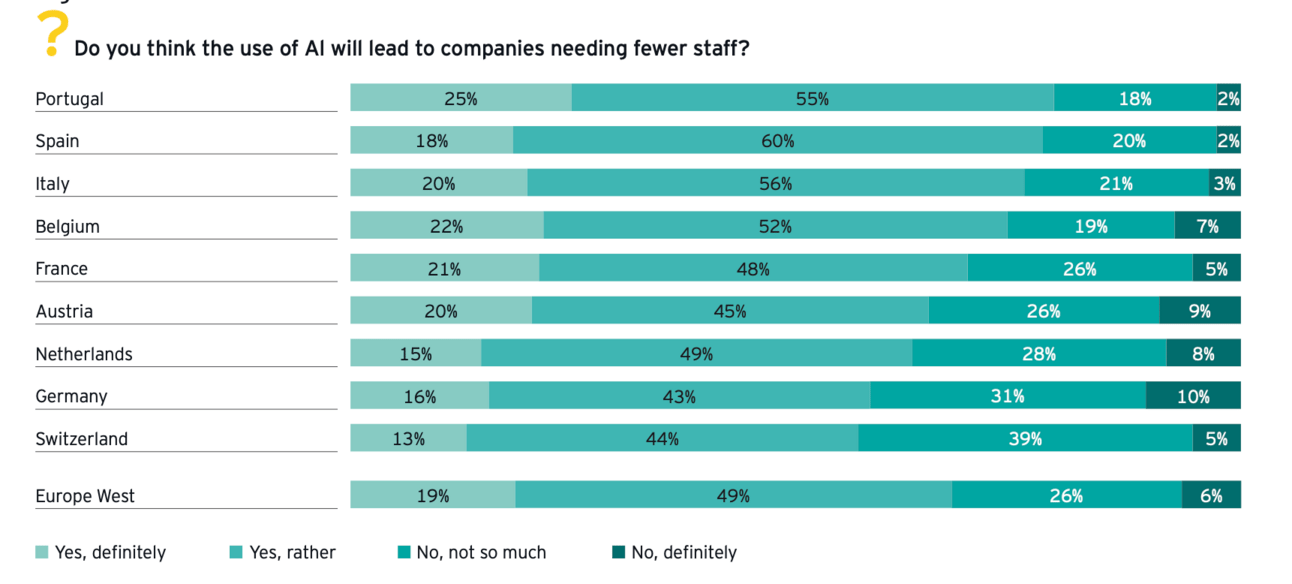- Cache Cookies AI
- Posts
- Swiss Aren't Worried About AI Taking Jobs 🇨🇭🤖
Swiss Aren't Worried About AI Taking Jobs 🇨🇭🤖
Plus 👩💻 Gender Gap in AI Skills


Welcome, humans.
Cache Cookies delivers your weekly dose of groundbreaking tech news, cool apps, brain-boosting knowledge, the latest on AI, and the lowdown on AI's wild side.
Here's the Scoop of this Week’s Cache Cookies!
🇨🇭 Switzerland is leading in AI Use: 82% of Swiss employees are already using AI, says EY’s "European AI Barometer."
💼 No Worries: Only 57% of Swiss workers fear job loss to AI. Experts point to high skills and less routine work—AI is seen as an opportunity, not a threat.
👩💻 Gender Gap in AI Skills: While 49% of male employees are actively enhancing their AI skills, only 40% of female employees are doing the same.
Read Time: 3 minutes
EY AI REPORT
AI in Europe: Swiss Companies Reap the Benefits
Switzerland is emerging as a AI success story: widespread financial gains, a positive employee mindset and comparatively low levels of concern around job losses, according to the EY European AI Barometer 2024, published last July. The report is based on a survey conducted in March 2024, gathering insights from 4,741 managers and non-executive employees across nine western European countries. With an impressive 82% of respondents in Switzerland using already AI technologies, the country is among the frontrunners in Europe. But what exactly is driving this high adoption rate, and what does it mean for businesses and employees in the country?
Adoption & Management Attitudes: Setting the Pace
82% of employees in Switzerland have already used AI, making the country second only to Spain (84%) in Europe. A remarkable 73% of Swiss workers are permitted by their employers to use AI applications at work, well above the European average of 52%. This widespread adoption is paying off, with 81% of managers in Switzerland reporting positive experiences with AI. Whether it's saving costs, boosting profits, or both, Swiss businesses are reaping tangible benefits from their AI investments. Spain (60%) and Italy (58%) also show strong positive impacts, while Austria, the Netherlands, and Germany trail behind, with less than 35% of managers sharing similar experiences.

source: EY European AI Barometer 2024
AI is being operationalized across various functions, with the most significant gains observed in IT (35%), marketing (30%), and cybersecurity (27%). While AI is driving change in these areas, sectors like legal and compliance have yet to fully tap into its potential. Most companies are still in the early stages of AI implementation, keeping a close eye on future advancements and the evolving role of AI.

source: EY European AI Barometer 2024
Prepared for the Future: Confidence in AI Transformation
Swiss employees are not just using AI—they're ready to embrace it fully. In the private equity, financial services, energy, and advanced manufacturing sectors, confidence is particularly high, with over 60% of employees believing their companies are well-equipped to continue the AI journey. In Switzerland, 57% of the workforce expects AI to be a top investment priority in the coming year, a sentiment shared by only 25% of respondents in Germany and 22% in Austria.

source: EY European AI Barometer 2024
Overall, 58% of Swiss employees are confident in their companies' ability to implement AI effectively. This confidence is mirrored in the high levels of self-education among Swiss workers, with 60% actively engaging in upskilling activities. Italy (55%) and Spain (54%) also report strong self-learning engagement, while Germany lags behind at 37%, highlighting a need for greater workforce awareness and training in AI.
The AI-Augmented Workforce: What’s Next?
As AI continues to evolve, many employees across Europe expect it to take over parts of their work, leading to more intellectually stimulating job roles. In Switzerland, 76% of respondents believe AI will soon handle some of their tasks, a sentiment echoed by workers in Spain, Portugal, Italy, and Belgium.

However, only 57% of Swiss respondents are worried about losing their jobs compared to the European average of 68%. This contrasts sharply with Portugal, where 80% of workers view AI as a threat to their employment. Adrian Ott, Chief AI Officer at EY Switzerland, attributes this to Switzerland's high density of well-qualified workers and the lower prevalence of routine work. As a result, the new technology is seen more as an opportunity than a threat. According to Ott, companies need to adapt to AI to avoid being overwhelmed by its rapid advances.

Interestingly, only a small proportion of respondents in German-speaking countries (Switzerland 16%, Germany 14%, Austria 17%) expect AI to replace human labor entirely, compared to significantly higher expectations in Italy (34%) and Portugal (32%).
Why It Matters to You 🦎
AI is not just transforming businesses—it's reshaping jobs and entire industries. To stay ahead of this curve, upskilling and reskilling are key. The high level of self-education among Swiss workers reflects a proactive approach to staying ahead of these changes. Organizations must invest in training programs that equip their workforce with the necessary competencies to thrive in an AI-driven economy. Additionally, fostering a culture of lifelong learning is crucial to ensure that employees remain adaptable and resilient in the face of technological disruptions.
According to survey results, many employees are dissatisfied with the level of AI training they receive at work. Switzerland leads the way, with 36% of respondents stating their employer provides sufficient training. However, in other countries, particularly Portugal, there is significant room for improvement, as only 14% of employees are satisfied with their current level of AI training. Most employees express a preference for live training and workshops (43%), followed by online courses (38%).
European AI Barometer report reveals a concerning gender bias in AI skill development, with 49% of male employees actively brushing up on their AI skills compared to only 40% of their female colleagues. This finding aligns with previous reports, such as Digital Swiss 2024, which noted that fewer than 10% of ICT specialists in Switzerland are women. A significant challenge for Swiss companies is the scarcity of generative AI skills, which hampers the recruitment of qualified talent. This skills gap is even more pronounced among women, who are less likely to use AI tools than men (12% vs. 21%). This trend is not unique to Switzerland, as there is a global disparity where only 30% of women use AI tools compared to 70% of men. This suggests that women are at a relative disadvantage in preparing for AI's impact on the workforce, potentially affecting their job security and career progression as AI becomes more integrated into various industries.
📜 WEEKLY QUOTE

JOB OPPORTUNITIES
That's it for now! Want more tasty AI insights? Visit our website and connect with us on Instagram, LinkedIn @Mila and @Zeynep. While you're there, consider spreading the word – share Cache Cookies with all your friends and colleagues who also like to stay sharp!






